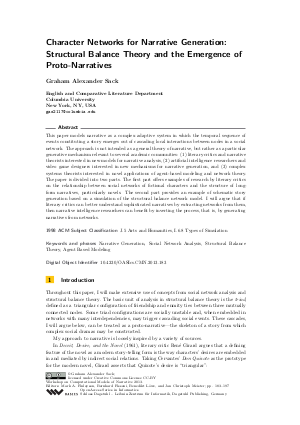Character Networks for Narrative Generation: Structural Balance Theory and the Emergence of Proto-Narratives
Author Graham Alexander Sack
-
Part of:
Volume:
2013 Workshop on Computational Models of Narrative (CMN 2013)
Part of: Series: Open Access Series in Informatics (OASIcs) - License:
 Creative Commons Attribution 3.0 Unported license
Creative Commons Attribution 3.0 Unported license
- Publication Date: 2013-08-02
File

PDF
OASIcs.CMN.2013.183.pdf
- Filesize: 8.6 MB
- 15 pages
Document Identifiers
Subject Classification
Keywords
- Narrative Generation
- Social Network Analysis
- Structural Balance Theory
- Agent Based Modeling
Metrics
- Access Statistics
-
Total Accesses (updated on a weekly basis)
0Document
0Metadata
Abstract
This paper models narrative as a complex adaptive system in which the temporal sequence of events constituting a story emerges out of cascading local interactions between nodes in a social network. The approach is not intended as a general theory of narrative, but rather as a particular generative mechanism relevant to several academic communities: (1) literary critics and narrative theorists interested in new models for narrative analysis, (2) artificial intelligence researchers and video game designers interested in new mechanisms for narrative generation, and (3) complex systems theorists interested in novel applications of agent-based modeling and network theory. The paper is divided into two parts. The first part offers examples of research by literary critics on the relationship between social networks of fictional characters and the structure of long-form narratives, particularly novels. The second part provides an example of schematic story generation based on a simulation of the structural balance network model. I will argue that if literary critics can better understand sophisticated narratives by extracting networks from them, then narrative intelligence researchers can benefit by inverting the process, that is, by generating narratives from networks.
Cite As Get BibTex
Graham Alexander Sack. Character Networks for Narrative Generation: Structural Balance Theory and the Emergence of Proto-Narratives. In 2013 Workshop on Computational Models of Narrative. Open Access Series in Informatics (OASIcs), Volume 32, pp. 183-197, Schloss Dagstuhl – Leibniz-Zentrum für Informatik (2013)
https://doi.org/10.4230/OASIcs.CMN.2013.183
BibTex
@InProceedings{sack:OASIcs.CMN.2013.183,
author = {Sack, Graham Alexander},
title = {{Character Networks for Narrative Generation: Structural Balance Theory and the Emergence of Proto-Narratives}},
booktitle = {2013 Workshop on Computational Models of Narrative},
pages = {183--197},
series = {Open Access Series in Informatics (OASIcs)},
ISBN = {978-3-939897-57-6},
ISSN = {2190-6807},
year = {2013},
volume = {32},
editor = {Finlayson, Mark A. and Fisseni, Bernhard and L\"{o}we, Benedikt and Meister, Jan Christoph},
publisher = {Schloss Dagstuhl -- Leibniz-Zentrum f{\"u}r Informatik},
address = {Dagstuhl, Germany},
URL = {https://drops.dagstuhl.de/entities/document/10.4230/OASIcs.CMN.2013.183},
URN = {urn:nbn:de:0030-drops-41617},
doi = {10.4230/OASIcs.CMN.2013.183},
annote = {Keywords: Narrative Generation, Social Network Analysis, Structural Balance Theory, Agent Based Modeling}
}
